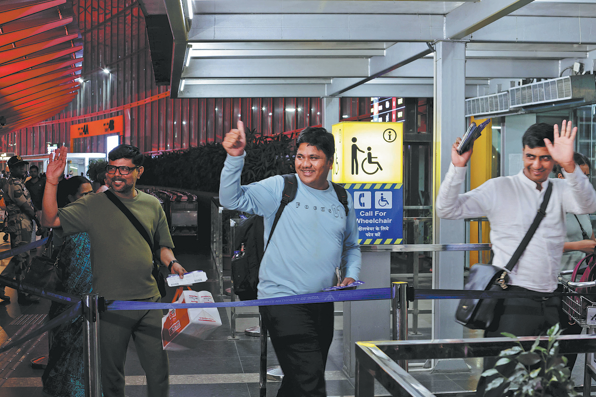Japan PM's remarks on Taiwan draw criticism
Erroneous statements violate one-China policy, erode mutual trust, observers say

Japanese Prime Minister Sanae Takaichi's provocative remarks on China's Taiwan recently drew heavy criticism from officials, experts and citizens domestically.
These statements misjudged Japan's current security environment and constituted a severe violation of the one-China policy, which could undermine the foundation of mutual trust between China and Japan, and even trigger regional security risks, they noted.
On Saturday evening, about 100 Japanese citizens gathered in front of the prime minister's official residence in Tokyo to protest against Takaichi's erroneous remarks and demand her resignation. The demonstrators chanted slogans such as "Retract your remarks, apologize immediately", "Takaichi step down", and "Those who cannot conduct diplomacy should not be prime minister".
Takaichi claimed at a meeting on Nov 7 at the Diet, Japan's legislature, that a Taiwan emergency involving the use of military vessels and military force from the Chinese mainland could constitute a "survival-threatening situation" for Japan. According to legislation, Japan's Self-Defense Forces could exercise the right of collective self-defense if such a situation is recognized as "survival-threatening".
Ukeru Magosaki, director of the East Asian Community Institute and a former senior official at Japan's Ministry of Foreign Affairs, told China Daily that if Japan were to take military action in a contingency involving Taiwan, it would be regarded as interference in China's internal affairs and would inevitably trigger responses from China.
"From the perspective of Japan's national security, this would yield no positive outcome," Magosaki said.
Magosaki warned that Takaichi's recent remarks not only "undermined the established political principles" but also "seriously distorted the existing mutual trust" between Japan and China.
Magosaki said this trust is based on the 1972 Japan-China joint statement, which acknowledges Taiwan as an inalienable part of China, and emphasized that mutual trust is one of the most important aspects of Japan-China relations.
"Takaichi's comments are entirely detrimental and bring no benefits. As a result, the relationship between Japan and its neighboring country China is further strained," he added.
Hiroshi Shiratori, a political science professor at Hosei University in Tokyo, said Takaichi's statements "exaggerate and even misjudge Japan's current security environment" and clearly deviate from Japan's self-claimed long-standing identity as a "peaceful nation" and the pacifist principles enshrined in its constitution.
Within this policy framework, discussions of deploying Japan's Self-Defense Forces in the event of a military intervention in Taiwan "not only depart from pacifist principles but also violate Japan's long-established diplomatic approach toward China", Shiratori said.
Japan and China's leaders had only recently had a long-awaited meeting, and it is regrettable that such remarks at this moment could damage bilateral relations, Shiratori said.
He said that Takaichi's comments not only affect Japan-China relations but could also place the security of the entire East Asian region at unnecessary risk.
Despite China's serious demarches and protests, Takaichi refused to retract her remarks that imply the possibility of armed intervention in the Taiwan Strait.
Takaichi's erroneous statements and actions also sparked criticism from multiple Japanese lawmakers who called on her to retract her remarks.
Successive warnings
Former Japanese prime ministers Yukio Hatoyama and Shigeru Ishiba also issued successive warnings regarding her provocative comments.
On Thursday, speaking on a TBS radio program, Ishiba said Takaichi's remarks were "very close to claiming that a Taiwan contingency is a Japan contingency", noting that previous governments have consistently avoided making definitive declarations on how the government would respond to specific scenarios regarding the Taiwan question.
Hatoyama addressed Takaichi's comments on X on Tuesday, emphasizing that Japan should not interfere in China's internal affairs.
Tomoko Tamura, leader of the Japanese Communist Party, in the House of Representatives Budget Committee on Tuesday demanded that Takaichi retract the statement she made in the same committee. Tamura asserted that what the prime minister should do is "not to stoke crisis, but to make diplomatic efforts to eliminate the risk of war".
Mizuho Fukushima, leader of Japan's Social Democratic Party, said on Friday that Takaichi's view of a "Taiwan contingency" as a "survival-threatening situation" is "completely illogical".
houjunjie@chinadaily.com

































